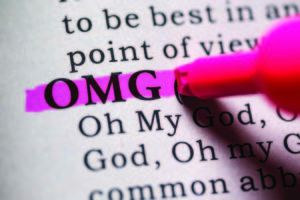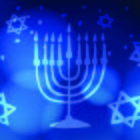Trending
OMG (abbr.): Make no mistake, it’s English.
October, 2017

If you’ve used a cellphone or gone online anytime in the last… well, ever, you’re probably familiar with these three capital letters: OMG. Like LOL or TTYL, OMG is an example of short message service (SMS), otherwise known as texting language. Expressed via text messages and online communication, OMG and other terms have become so common that even dictionaries are adding them to their pages. But is this a symbol of our lazy, distracted times, or just proof of a language’s evolution? Well, the sky isn’t falling just yet… AFAIK.
A New Way of Writing
As the name tells us, we have text messaging to thank (or blame) for giving us SMS language. The first text message was sent in December 1992. Reading—you guessed it—“Merry Christmas,” this brief message was quite a technical feat for its time. Sure, it’s a little ironic that the scientists who sent it didn’t just go with “Merry Xmas,” but they didn’t exactly have precedent for what they were doing. Back then, the OMGs and ROFLs of the world only existed in online chat rooms and discussion boards. No one had any clue how popular SMS would become or how it would affect our language.
But as texting caught on, those abbreviations and acronyms quickly made the jump to our cellphones, and it’s easy to see why—its simplicity: SMS was cheap, easy-to-use and worked well across scores of cellphone networks. Simplicity has its limits though, which is why texters had to keep their messages within 160 awkwardly thumb-typed characters, making some everyday comments difficult to communicate. The solution? SMS users said goodbye to long-winded phrases and spellings (like “see you tomorrow”) and hello to enough initialisms, acronyms and abbreviations (“c u tmrw”) to make a purist’s head spin.
OMG. LOLZ! K SRSLY?
Technically, OMG is an initialism, formed from the first letters of the phrase it replaces—usually “Oh my God,” although the “G” can also stand for “goodness” or “gosh.” Oxford English Dictionary, which added both OMG and LOL in 2011, defines it as an informal exclamation for expressing “surprise, excitement, disbelief, etc.,” such as the surprise you might want to express when you learn that OMG actually predates texting by eight decades! Recently someone turned up a 1917 letter—from
a retired admiral to future Prime Minister Winston Churchill—in which the word makes its earliest known appearance.
But OMG as we know it really belongs in the Internet age. According to Merriam-Webster, which added OMG in 2009, the word “gained traction as we moved towards communicating online.” While it was text messaging that first spread OMG and other SMS terms, it was on the Internet that these expressions really dug into our zeitgeist, through incessant use in memes, instant messaging and blogs. That was part of the reason Merriam-Webster entered OMG when it did. The dictionary says it was aware of OMG for at least 15 years but waited until it had clearly become widespread, both online and offline, before entering it.
The Ruin of English?
Even though some of us may wince a little when we hear about dictionaries making “slangy” words like OMG official, it’s nothing new to wondering about where English is headed. The good news (if you’re needing some) is that SMS language probably isn’t doing much harm. While some anecdotes and studies suggest that students’ grammar, spelling and punctuation use have weakened, others indicate that both the use and influence of SMS language have been exaggerated. Generally speaking, most kids aren’t peppering their book reports with IDKs and IMHOs. And if it’s any consolation, English is a sturdy language. It survived Valley Girls and will probably survive this, too. t8n
SMS Mini-Glossary
afaik: As far as I know
c u: See you
idk: I don’t know
imho: In my humble/honest opinion
lolz: LOL, in the plural
zomg: OMG x 10, used sarcastically
SMS Around the World
mdr: (French) Mort de rire, “dead of laughter”
mr6: (French) Merci, “thanks”
hla: (Spanish) Hola, “hello”
q tal?: (Spanish) Qué tal, “what’s up?/how are you?”
gn8: (German) Gute nacht, “good night”
bjs: (Portuguese) Beijos, “kisses”
555: (Thai) Pronounced “hahaha,” used to express laughter












